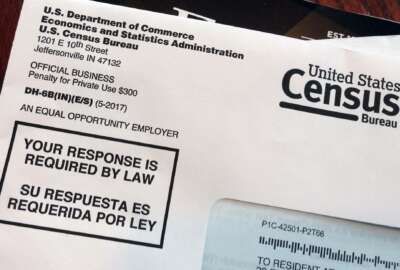
Trump’s budget request for 2020 Census ‘falls short’ of Commerce’s previous targets
Commerce Secretary Wilbur Ross’s absence from a fiscal 2020 budget hearing Tuesday struck a nerve with some members of the Senate Appropriations subcommittee ...
Best listening experience is on Chrome, Firefox or Safari. Subscribe to Federal Drive’s daily audio interviews on Apple Podcasts or PodcastOne.
Commerce Secretary Wilbur Ross’s absence from a fiscal 2020 budget hearing Tuesday struck a nerve with some members of the Senate Appropriations subcommittee on commerce, justice, science and related agencies.
Sen. Jeanne Shaheen (D-N.H.), the subcommittee’s ranking member, said she was “extremely disappointed” Ross did not appear before the subcommittee to testify about the budget request, which she said fell short of what Ross previously said the decennial count would need.
Shaheen said committee staff reached out to Ross’ office to inquire about his availability to testify, but the secretary still declined to appear before lawmakers.
“Even after the chairman contacted his office, he has declined to appear to defend his department’s $12.2 billion request … or to answer why the budget does not include funding for the 2020 census that he has told us was critical,” Shaheen said.
Subcommittee Chairman Jerry Moran (R-Kan.) said Ross had previously spoken directly with members and staff about the need for the funding based upon his estimate, “yet the budget this year falls short of what Secretary Ross told us would be needed.”
Census Bureau Director Steven Dillingham said Congress has funded the bureau “consistent” with a previous $14.1 billion lifecycle cost estimate the Commerce Department has provided.
Related Stories

Census Bureau ‘confident’ 2020 website can handle major web traffic next year
“We have not encountered any contingencies that cause any concerns that we cannot deliver a complete census based on the president’s budget,” Dillingham said. “If you don’t encounter those obstacles or unknowns, then, in fact, the confidence level rises. And that’s the case here. The confidence level has risen — we are on budget, we are meeting all the thresholds and the milestones that we’ve established.”
President Donald Trump’s FY 2020 budget request sets aside $12.2 billion for the Commerce Department, and provides a $6.1 billion budget for the Census Bureau — an increase of more than $2.3 billion from fiscal 2019 enacted levels.
However, the Census Project, a coalition of national, state and local organizations focused on an accurate population count, called the president’s budget request a “shockingly low amount” for the bureau, citing Ross’s previous estimate of $7.4 billion for decennial operations alone.
Shaheen said the fiscal 2020 budget request falls more than $900 million short of what Ross previously recommended for the upcoming 2020 count. That sum includes funding for increased field staff, higher pay for temporary census employees amid a tight labor market and for contingencies in case of natural disasters.
Dillingham said the president’s budget request still includes $1.2 billion in contingency funding.
“This is funding that’s available to be shifted, to be applied to new priorities, to be applied to unforeseen circumstances,” he said.
Dillingham told Shaheen the bureau doesn’t anticipate the president’s budget request falling short of what the decennial team will need, but said the bureau would notify lawmakers in the event of an emergency.
“If something really unknown occurs, something major — it could be a natural disaster, it could be some type of potential intrusion, cybersecurity issue that no one could have foreseen or prevented —if something of that nature we to occur, I’m confident that the administration and certainly the Census Bureau would come forward and ask the Congress for additional funding,” he said.
Copyright © 2024 Federal News Network. All rights reserved. This website is not intended for users located within the European Economic Area.
Jory Heckman is a reporter at Federal News Network covering U.S. Postal Service, IRS, big data and technology issues.
Follow @jheckmanWFED




